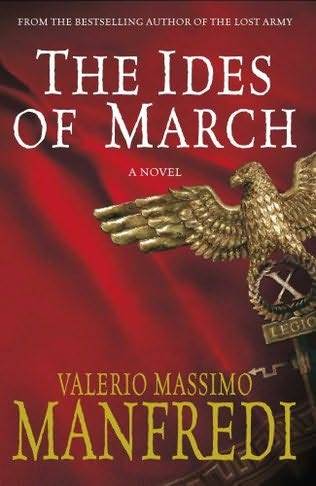The Ides of March. A New Historical Thriller by Valerio Massimo Manfredi
Novelist, archeologist, topographer of the ancient world and screenplay writer Valerio Massimo Manfredi presented his latest historical thriller, The Ides of March, to a packed house at the Italian Cultural Institute of Chicago. Director Tina Cervone introduced Manfredi noting that, “we’ve hosted many internationally renowned contemporary writers, including Umberto Eco, Beppe Severgnini, and Gianrico Carofiglio. I’m pleased to renew our collaboration with Europa Editions, which brings leading European writers to the American public.”
Faithful Valerio Massimo Manfredi fans had clearly been anticipating the release of his latest bestseller, The Ides of March, a tautly constructed narrative of Caesar’s last eight days that cuts back and forth between the harrowing journey of one of Caesar’s most trusted centurions through mountains and over rivers as he races to warn Caesar that he’s in danger; the secret meetings of the conspirators planning Caesar’s assassination; and the daily life of Caesar himself, including his last dinner party with Rome’s elite, an evening that was documented by Plutarch and that ended with a conversation about death in which Caesar, when asked what sort of death is best, replies "one that is rapid and sudden.”
Professor Manfredi’s conversation with the audience was wide ranging and people asked questions that provided for profound discussion.
To begin with, what is difference between history and the historical novel?
“History is an attempt to construct a common memory. Memory is identity. In English the distinction between a story and history is more defined because you have the word ‘history’ while in Italian we don’t. ‘Storia’ means history in Italian and ‘storia’ also means a story. In any case, the goals of the historian and the storyteller are different. Historians have a burden of proof. But Homer, in his epic, clearly invented creatures like the Cyclops. An epic doesn’t have to be factually true because an epic’s goal is to provide models of human behavior.”
How does he define literature's role in society?
“Our mind is bigger than life. To fill the gap we need more lives, and most of all we need emotions, for emotions give sense to our life. The things we remember are the things that made us feel - a person, music, a gaze, a sunset. What moves the soul gives life meaning. Literature can give us what personal destiny denied. Some people lead interesting lives, some don’t. When someone reads one of my novels, they can become Alexander for an afternoon. This is the magic of storytelling.”
Manfredi spoke about the tradition of storytelling in his family: “Storytelling survived the invention of writing and print. My grandfather was a storyteller. When he was alive people didn’t have television, video games and the internet. They relied on the tradition of oral storytelling for entertainment. In the north where my grandfather lived there would be a lot of snow during the wintertime and temperatures were freezing - this was before global warming. My grandfather was invited to people’s homes and villages to tell his stories, often his theater would be a stable, because those were the warmest places. He was a star.”
How important is historical research in Manfredi’s novels? “The details in the novel must be correct. Details give authenticity and make the novel real. But you don’t go to a movie or read a book for a history lesson. What matters when reading my book is that you are moved by it. In history there is the chronological dimension, the political dimension. A novelist adds a third dimension, depth."
Would the world have been different if Caesar hadn’t been assassinated?
“Yes. Caesar’s murder changed the course of history. History is like a river, and an act of this magnitude changes its flow and its banks. The last twenty minutes of Caesar’s life are out of a thriller. At one point the conspirators almost killed themselves, thinking that they’d been betrayed.”
What are Manfredi’s work habits?
"In order to get into a meditative space that allows me to enter the creative world, I write in the darkness of night with music playing. The darkness and music cut me off from the outside and put me in touch with my emotions. I have a young friend who creates music for me on her computer. I describe to her what I'm writing, and she puts together a soundtrack of my novel. This is what I listen to when I write.”
And finally, his current project is?
“I'm working on a trilogy based on an Indian epic that may become a Bollywood movie. I also write short stories, and a book of my short stories, some of which I’ve written during the past year, will be coming out soon.”






































i-Italy
Facebook
Google+
This work may not be reproduced, in whole or in part, without prior written permission.
Questo lavoro non può essere riprodotto, in tutto o in parte, senza permesso scritto.